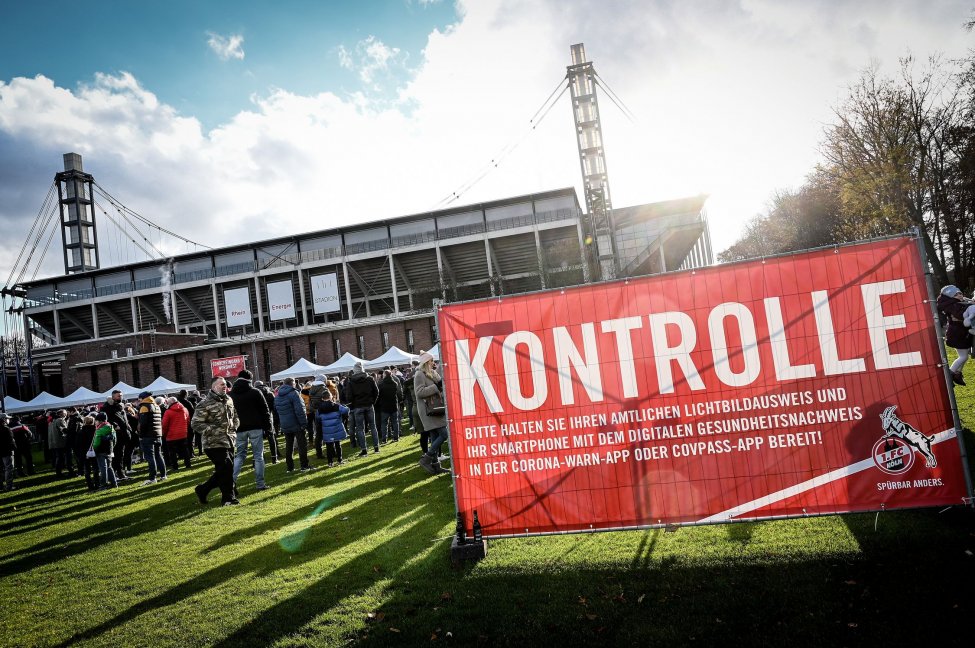A sign warns soccer fans of COVID-19 restrictions at a stadium in Cologne, Germany, prior to a Bundesliga match on Saturday. A German official said the first suspected case of the Omicron variant has been found in the country. Photo by Sascha Steinbach/EPA-EFE
Nov. 27 (UPI) — A German official said Saturday he suspects the first case of the Omicron COVID-19 variant has reached the country.
“It is very likely that the #Omicron variant has already arrived in Germany,” Kai Klose, social affairs minister for the west-central German state of Hesse said in a thread of tweets.
The announcement came a day after the World Health Organization designated the Omicron variant, an emerging strain of COVID-19 which originated in South Africa, as a “variant of concern” due to its large number of mutations.
Klose said that sequencing is underway for the suspected first case in Germany and the person has been quarantined.
“Several mutations typical of Omicron were found last night on a returnee from South Africa,” he wrote. “So there is a high level of suspicion that the person has been isolated at home. The complete sequencing is still pending at the current time.”
“Please protect yourself and those around you. If you’ve returned from southern Africa in the past week, limit your contacts and get tested,” Klose added.
The minister later confirmed the person suspect to have the variant arrived through Frankfurt airport, German broadcaster Deutsche Welle reported.
On Saturday, Germany declared South Africa a virus variant area, only allowing airlines to carry German nationals back to the country.
The Health Ministry ordered airports to separate passengers arriving from South Africa from other arrivals, and said they must quarantine 14 days regardless of vaccination status.
Germany reported 67,125 new COVID-19 cases Saturday, the Robert Koch Institute for infectious diseases told DW.
Since the pandemic began, Germany has had more than 5.7 million cases of COVID-19 and more than 100,000 people with COVID-19 have died, according to Johns Hopkins University.
The United States has the highest number of COVID-19 cases and deaths of any country worldwide, at over 48 million cases and over 776,000 deaths, according to JHU.
U.S. President Joe Biden said in a statement Friday the country would restrict travel from South Africa and seven other countries starting next Monday.
New York Stock Exchange stocks fell to new lows upon word of the new and more dangerous strain of COVID-19.
European Union member states closed their borders to seven South African countries because of the variant, and Canada and Britain have imposed travel restrictions.
If the Omicron variant is confirmed in the traveler through Frankfurt, it would be the second case of Omicron in the European Union after Belgian authorities announced Friday the same variant had been confirmed in a traveler returning from Egypt.
Marc Van Ranst, head of the Laboratory of Clinical and Epidemiological Virology at the Rega Institute, told EuroNews that the Omicron variant was identified in a traveler who returned from Egypt on Nov. 11 and first showed symptoms on Monday.
Belgium had recently increased restrictions, including forcing employees to work remotely four days a week through mid-December, to stop the spread of a new COVID-19 wave.
According to JHU, Belgium has over 1.7 million COVID-19 cases and over 26,000 deaths.
Meanwhile, Dutch authorities have been sequencing samples from 61 passengers from two planes returning from South Africa Friday who tested COVID-19 positive.
Pharmaceutical companies have announced plans to test their COVID-19 vaccines efficacy against the Omicron variant.
British-based health analyst Dr. John Campbell told DW Saturday that Omicron is “not likely to completely invalidate vaccines.”
“It might reduce the efficacy but it’s looking like the vaccines will continue to prevent severe illness, hospitalization and death in the vast majority of cases,” Campbell said.
“The good news is that [vaccine] manufacturers assure us they are able to genetically tweak their vaccines quite quickly,” he added. “It’s quite reasonable to assume that they can get a vaccine that is more specific to the Omicron variant within two months.”
